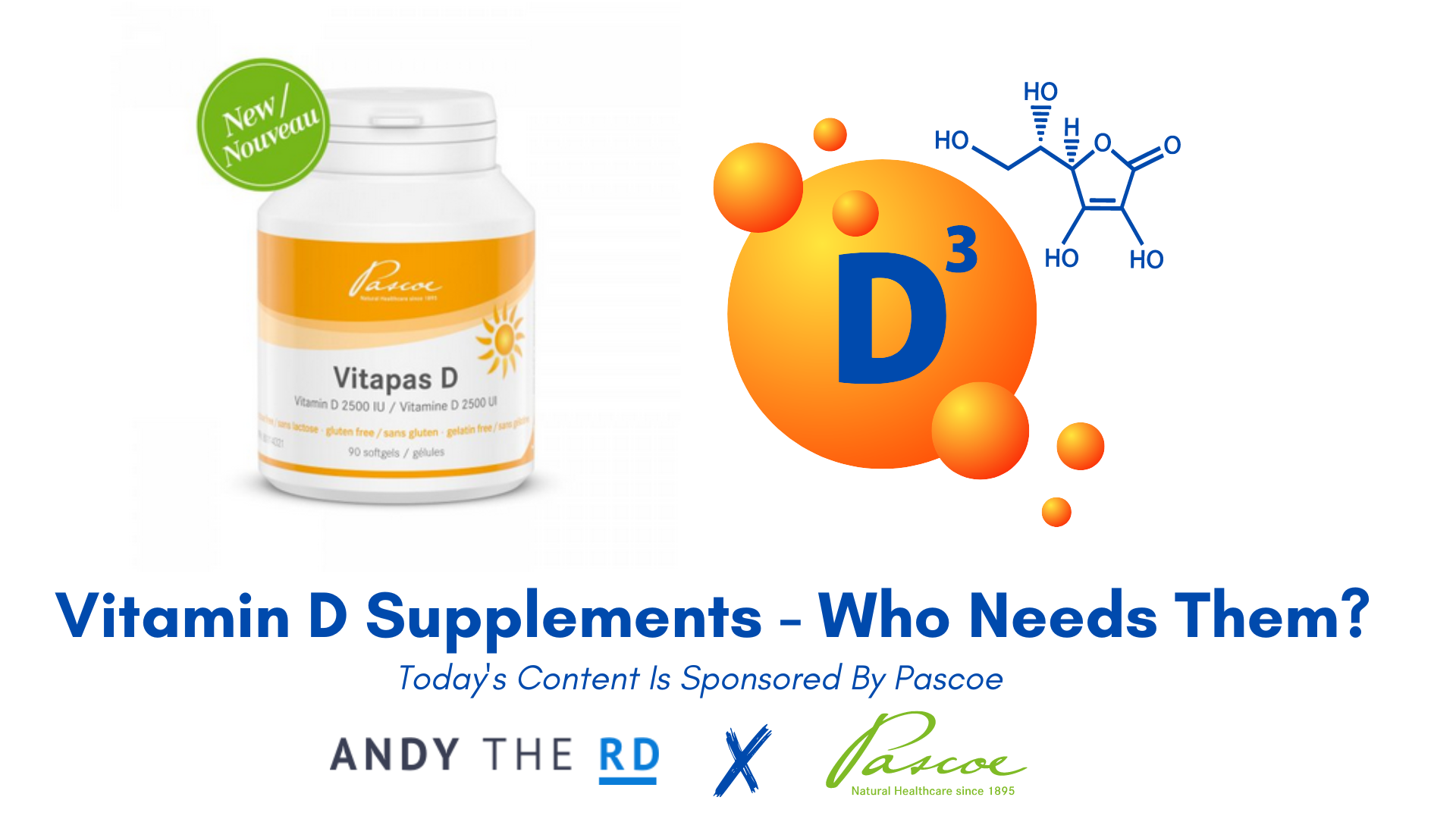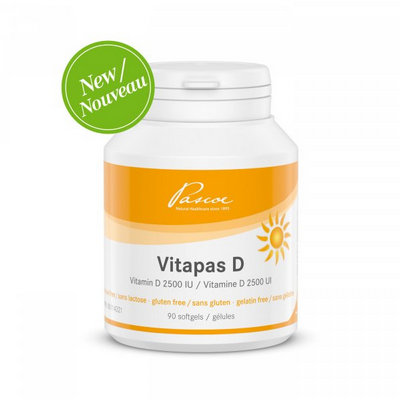Well, this is going to be a fun one.
Vitamin D3 supplementation is an equal parts compelling and complex subject matter, and I’m thrilled that Canadian supplement company Pascoe has brought me on board to discuss it alongside the promotion of their new Vitapas D Vitamin D supplement, which we’ll revisit a bit later in today’s piece.
Let’s start with two factors that make Vitamin D such a fascinating topic to explore:
- It’s found naturally in very few foods
- Our skin can make it from the sun, but only half the year.
So right off the bat we can identify it is a very unique compound.
On top of that we have to also explore two questions that arise with the use of any supplement:
- Do you need to take it?
- If so, how much?
Clearly we have some work to do here, so let’s get to the good stuff.
Vitamin D Status of Canadians
The current consensus is generally that blood levels of Vitamin D that are > or equal to 50 nmol/L are sufficient for the vast majority of people to optimize their bone and general health, although its possible that levels 75 nmol/L and above may confer additional health benefits.
Statistics Canada data suggests that about 2/3 of Canadians are currently above this 50 nmol/L threshold with the number being higher in the summer (75%) and lower in the winter (60%).
Generally females and those who take Vitamin D supplements had higher levels while males in the 20-39 demographic were most likely to fall beneath this threshold.
The summer vs winter disparity makes sense because for about half of the year in Canada ( Oct-March) the UV rays from the sun are not strong enough to stimulate sufficient Vitamin D3 production in the skin.
In fact, a 2015 study out of the Canadian Medical Association Journal assessed the role of sun exposure to improve Vitamin D status in Canadians and came to the following conclusion:
“Although sun exposure is an important source of vitamin D, Canadians should look to other safe sources to meet the body’s vitamin D requirements throughout the year.”
That leaves food and supplementation, so let’s explore those next.
Vitamin D In Food & Supplements – How Much Do You Need?
Vitamin D requirements for those aged 1 and above range from 600 IU to 800 IU (in those 70+) per day.
Fatty fish like salmon and trout contain 100%+ of this requirement in an 150 gram serving, which is why most studies show that eating more fish increases one’s D3 levels.
Egg yolk, canned sardines, milk & fortified milk alternatives also contain meaningful amounts per serving and can play a role in contributing to total daily D3.
Many Vitamin D supplements on the market contain 1,000 IU for this reason, which is about the same amount that’s in 150 grams of salmon or trout – some of the richest dietary sources of D3.
And while many Vitamin D supplements contain 1,000 IU, a number that meets the baseline requirements of an otherwise healthy person, Health Canada recently allowed Vitamin D supplements up to 2,500 IU to be sold without a prescription.
This is actually the per softgel amount in Pascoe’s new Vitapas D product.
So why did Health Canada do this?
Let’s explore that next.
Vitamin D Supplement Regulations – Introducing the 2500 IU Dose
There are two main justifications that Health Canada provided us for updating their regulations.
- To respond to the demand for a supplement limit increase from consumers, doctors and industry leaders – given that growing scientific and public interest around Vitamin D3 has shot up in recent years.
- Because the totality of the safety data indicated to them that 2,500 IU is a safe daily maximum dose of Vitamin D3 for adolescents, adults and healthy children aged 9 and older.
With all of this in mind, let’s explore who might be a candidate for a higher dose D3 supplement.
Vitamin D3 Supplements – Who Might Need A Higher Dose?
I think the most obvious answer is those with known Vitamin D deficiency who were unable to improve their Vitamin D status with a lower dose, but ultimately those are decisions to be made in concert with your healthcare provider.
We can also acknowledge the fact that certain individuals may be at an above average risk of suboptimal Vitamin D3 levels as compared to others in the population, these include:
- Those who do not consume much fatty fish (the richest source), egg yolks or milk
- Those with conditions which inhibit nutrient absorption (malabsorption, gastric bypass etc)
- Those with little to no ability to access sunlight exposure
- Those with chronic liver/kidney issues that may affect Vitamin D status
- Those who are older(70+), as Vitamin D productions drops with age
- Those taking medications that impact Vitamin D levels (ask your doctor)
- Those with osteoporosis or inflammatory bowel diseases (crohn’s, colitis)
- Those with darker skin, which tends not produce as much Vitamin D from the sun
Individuals who fit one or more of the criteria above may be more likely to have sub optimal Vitamin D levels and supplementation at a higher dose may be justified – speak to your healthcare provider to determine the amount that’s right for you.
In inflammatory bowel disease, for example, I’ve seen evidence that taking 2,000 rather than 1,000 IU of D3 daily may lead to better symptom improvement which ultimately supports the easy availability of slightly higher dose D3 as per Health Canada’s regulation change.
Pascoe Vitapas D 2500IU
I have to once again thank Pascoe for supporting today’s piece in collaboration with the promotion of their Pascoe Vitapas D 2500IU product which surely has a role to play in preventing Vitamin D deficiency.
Health Canada has approved this product for use by Adults 18 years and older: Take 1 capsule daily.
In partnering with Pascoe for today’s content I’ve also been provided a voucher code – ANDY10 – which will offer you 10% off your purchases from Pascoe.ca.
Vitapas D Product Features
- Plant-based softgel with no added fillers or stabilizers
- Easy-to-swallow softgel ( 11mm in length)
- Formulated in an olive oil base
- Gluten-free, lactose-free, peanut-free, and gelatin-free.
The world of Vitamin D is a complex one because emerging evidence and scientific interest contributes to the ever changing landscape.
My hope is, in spite of that, you found today’s piece insightful.
Until the next one,
Andy De Santis RD MPH




